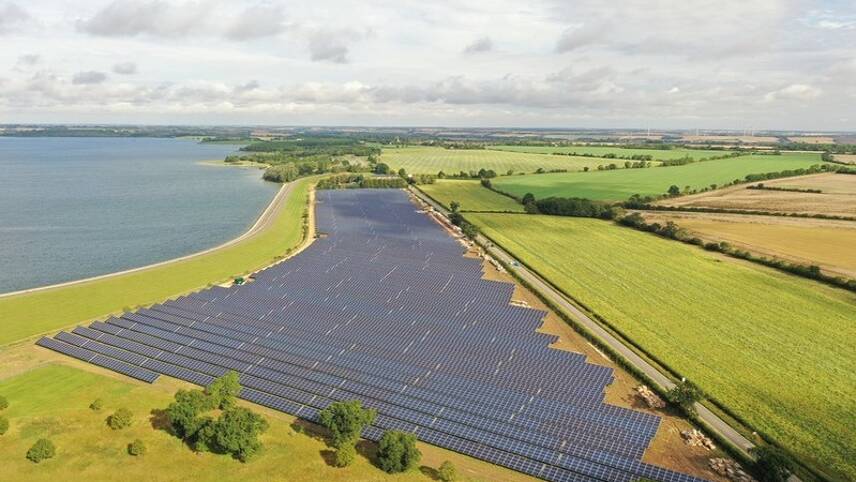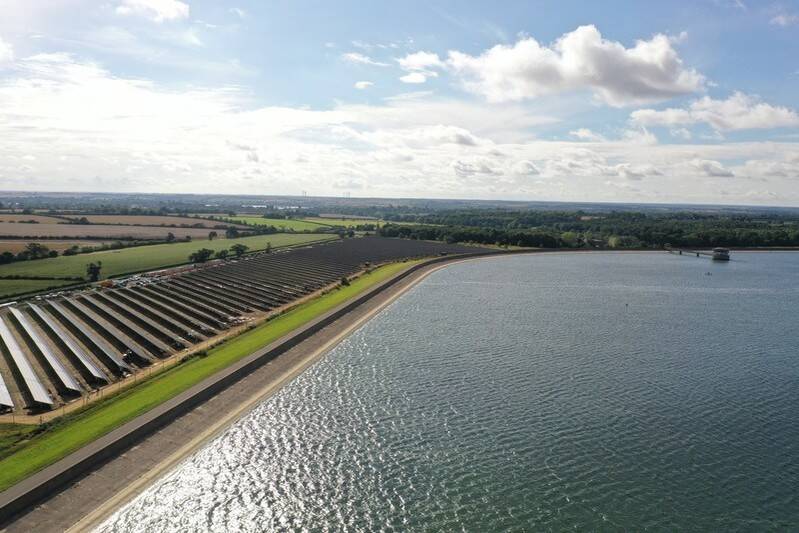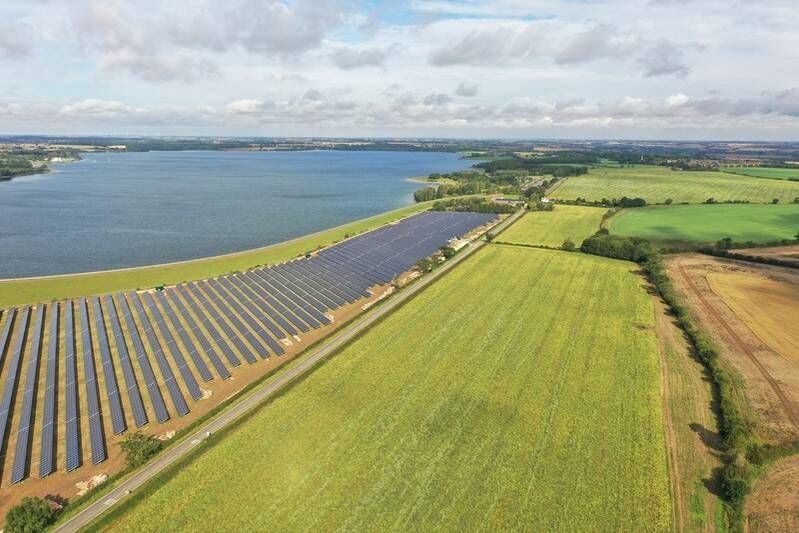You’ve reached your limit!
To continue enjoying Utility Week Innovate, brought to you in association with Utility Week Live or gain unlimited Utility Week site access choose the option that applies to you below:
Register to access Utility Week Innovate
- Get the latest insight on frontline business challenges
- Receive specialist sector newsletters to keep you informed
- Access our Utility Week Innovate content for free
- Join us in bringing collaborative innovation to life at Utility Week Live

Almost a year since being recognised at the 2021 Water Industry Awards’ for its rollout of solar power and energy storage, Anglian Water’s programme strategy manager for renewables, Dan Blunt, reflects on the ‘huge milestone’ and subsequent work towards decarbonisation.
According to Anglian Water – the provider of water and water recycling services to almost seven million customers across the East of England – switching on its largest solar array at Grafham Water in Cambridgeshire in September 2020 marked a significant milestone en route to becoming net zero by 2030.
Judges at the 2021 Water Industry Awards agreed, crowning the company’s broad rollout of solar power and energy storage as its Net Zero Carbon Initiative of the Year. Anglian’s sustainability credentials are demonstrated by installations such as those at Grafham Water, which is England’s third largest reservoir and a site of special scientific interest for over 30 years.
“Anglian Water showed a strongly evidenced and well thought through approach with a clear demonstration of benefits,” judges said of the firm’s successful entry. “We were impressed by the strategic thinking which underpinned the work and in combination benefits which this enabled.”
At the time, Anglian’s track record on carbon reduction had seen it reduce capital carbon by 61% since 2010, cut operational carbon by 34% since 2013/14 and save close to 400,000 tonnes of carbon during the five years prior – figures which also led to the firm being chosen to co-sponsor the water sector’s joint commitment through Water UK to reach net zero by 2030.
- View the full list of Water Industry Award 2022 categories here
Building on existing progress
According to Dan Blunt, Anglian’s programme strategy manager for renewables, winning the Net Zero Initiative of the Year award in 2021 was a “brilliant moment” for the firm’s carbon neutrality team.
“It was great to have the choices we’ve made and the strategy we’ve adopted validated by a panel of industry experts, and gave us all a fantastic boost in the midst of an incredibly busy and productive year,” he tells Utility Week Innovate.
“As our industry colleagues will know, progress to net zero is a race against time, and 2021 felt like a huge milestone, not just for us and the water sector, but globally, with COP26 driving international progress.”
 In terms of renewables specifically, Blunt reflects that Anglian has registered strong progress across its asset base over the past year – with two further solar arrays energised.
In terms of renewables specifically, Blunt reflects that Anglian has registered strong progress across its asset base over the past year – with two further solar arrays energised.
However, he adds that the year since scooping the Net Zero Initiative of the Year gong has not been without its challenges. “We’ve learned a lot about the volatility of external market conditions, with commodity prices making solar, in particular, more complex and costly to deliver than in previous years,” Blunt says.
“With that in mind, we’ve thought smartly about other routes to achieve our renewable ambitions, including launching a new renewable energy framework which will enable us to engage in partnerships with owners and developers of renewable energy assets close to our sites. We’ve also engaged in a sleeving deal with our energy provider SSE to sleeve green renewable power into our sites.
“So as we look forward into 2022, we’re in a strong position to continue to build on our progress, but always ready to learn, and keen to hear from others with lessons to share.”
Collaboration and decarbonisation
Looking ahead, Anglian harbours ambitions to more than double the amount of power the water company generates from renewable sources by 2025 in order to power 44% of its operations.
The firm’s renewables programme has also seen Anglian collaborate with developers to slash emissions, reduce reliance on grid electricity, and generate clean, low-cost energy to help power energy-intensive water treatment facilities.
For example, working in tandem with solar partner HBS New Energies and PPA funder the Green Investment Group, the nearly 43,000 module solar array at Grafham Water will generate more than a quarter of the 45 million kilowatt hours of energy used by the site annually and save around 3,500 tonnes of carbon per year.

What’s more, Anglian’s AMP6 renewables programme was carried out and is managed under a 25-year PPA contract with Innova, HBS New Energies and Macquarie GIG and saw it build 15MWp of solar, reducing carbon emissions by 4,000 tonnes of CO2e and increasing renewables generation by approximately 10%, while a hook-up with Next Energy Capital (NEC) as part of the UK’s largest unsubsidised solar and renewables framework will see NEC design, build, own and operate more than 35MW of Anglian’s solar assets as part of a 25-year contract.
Net zero hierarchy
Blunt adds that since the 2021 Water Industry Awards, Anglian has also published its net zero strategy route map, setting out how the firm will reach net zero by 2030 through a three-step hierarchy of reducing emissions, decarbonising electricity supply and removing or offsetting residual emissions.
Said plans have seen Anglian secure the water sector’s first sustainability-linked bond tied to net zero targets. Blunt explains that the rate of interest paid on the £300 million bond will be linked to 2025 transitional carbon targets to reduce net operational carbon by 30% from 2018/19 levels by 2025, and capital carbon by 65% from a 2010 baseline by the same date.
“Our biggest reductions will be delivered through our energy efficiency and renewable energy generation and storage,” he says. “By installing up to 238 GWhs of solar generation on and around our own sites, through power purchase agreements and implementing energy efficiency measures that’ll reduce power demand by 58GWhs per year – that’s equivalent to the electricity demand of over 15,000 UK homes. We’ll also procure green electricity for all our remaining grid requirements.”
Building on the work already underway, Blunt highlights decarbonising Anglian’s vehicle fleet as another key component of its net zero route map. The firm is pledging to replace 90% of all small fleet vehicles with electric equivalents by 2030, gradually switch medium-sized vehicles to hydrogen or alternative fuels such as biomethane, and change 55% of HGVs to run on liquefied natural gas.
Blunt adds that biogas has a similarly important role to play. “We’re keen to maximise its value, upgrading biogas production to biomethane that can be exported to the grid, used as transport fuel or supplied to industry, which will help to reduce emissions in more challenging sectors of the economy,” he says.
“We’re also going to deploy alternative fuels – we’ll switch 100% of our gas oil demand to hydrotreated vegetable oils and develop a plan to maximise the opportunities and benefits for hydrogen across all our operations.”
Blunt also refers to offsets as being “at the bottom of our pyramid”. “We’re working with local partners to develop credible carbon offset schemes to deliver co-benefits of economic growth, improved catchment management and natural habitat creation,” he says.
“Our offsetting plans include planting 50 hectares of woodland on Anglian Water sites, exploring sequestration opportunities using wetlands, marshes and grasslands and working with landowners to develop land management schemes that avoid and remove emissions.
“These transitional targets mark a key step towards our 2030 targets of net zero operational carbon and a reduction of 70% in capital carbon emissions from the same baselines.”
Please login or Register to leave a comment.